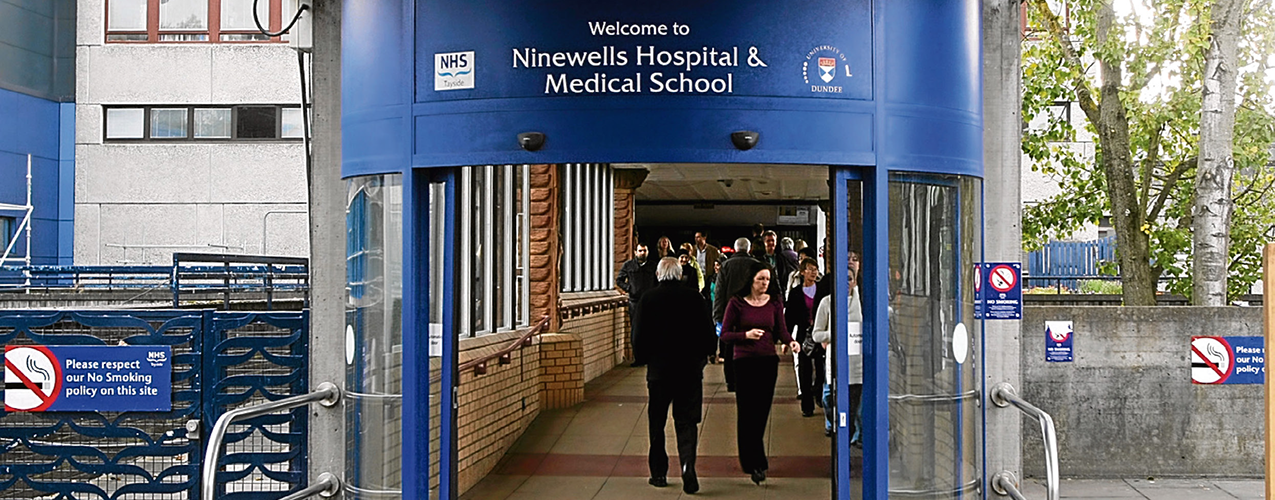NHS Tayside
Delivering effective records management at NHS Tayside
Using the RFID device saves time rather than having to do extensive searches of the library
Fiona Wallace
Clerical Officer
Stracathro NHS Tayside
iFIT is a great addition to the day-to-day running of Medical Records and has definitely improved all areas of case note management.
Liz Somerville
Clerical Officer
Perth Royal Infirmary
Background:
NHS Tayside and the need for an effective records management system
NHS Tayside is the Scottish Health Board responsible for operating hospitals within the Angus, Dundee, Perth and Kinross areas. It has three main hospitals, namely Perth Royal Infirmary, Stacathro Hospital and one of the largest teaching hospitals in the world, Ninewells Hospital. The Health Board’s Health Records department manages more than 515,000 records across numerous library facilities.
The amount of available storage for health records at NHS Tayside was becoming increasingly challenging, prompting the team there
to identify a solution that would help improve the performance of the health records service generally. The team approached Idox to deliver an automated process for requesting case records, in order to halt the expansion of their shelves. The solution implemented – the iFIT hospital inventory and records management platform – has since enabled Tayside to lower overheads associated with health records storage and management, and deliver an enhanced GS1-compliant service to patients.
Challenge:
Finding a more effective medical records filing method
NHS Tayside was keen to overcome its storage challenges. Although the team’s Patient Administration System (PAS), at that time offered a case note tracking function, it was limited in capability. In addition, the volume of paper records was increasing annually at an unsustainable rate, placing greater pressure on storage capacity.
The Health Board filed case notes in Community Health Index (CHI) order. Ruth Anderson, Head of Health Records at Tayside explains:
“Each record is filed into the correct position in numerical order on the shelves. It was labour-intensive to continually move records to create space on the shelves. Re-filing of returned records required a dedicated area for pre-sorting and multiple handling, as records had to be emptied from boxes, roughly sorted into CHI order in temporary locations before finally being put away in their designated locations. This process required valuable space and intensive labour hours to accomplish.”
Tayside also wanted to find a solution that would reduce service overheads, ease the retrieval of case notes outside the library, and introduce an automated process for making requests.
Solution:
Deploying iRecords for easier tracking, storage and retrieval
NHS Tayside decided to invest in the iRecords solution from Idox’s iFIT hospital inventory and records management. Implementation involved a redesign of the Health Board’s daily filing processes. All locations were assigned Global Location Number (GLN) codes, providing immediate GS1 barcode standard compliance and enabling location-based filing – a space-saving alternative filing system which also eliminates pre-sorting and all other manual tracking activities.
The deployment was supported by Idox’s installation of fixed radio-frequency idenification (RFID) sensors to track case note movement, the provision of staff-issued handheld devices to locate case notes, and the automation of departmental business processes. This resulted in immediate efficiency savings in tracking, pulling, re-filing and auditing, as well as helping the Health Board meet NHS directives.
Outcome:
A more efficient team delivering an improved service to patients
Prior to implementation, Idox and Tayside estimated that the automation of labour-intensive processes within the Health Records department would save the Health Board 19 whole time equivalents (WTE), in the first year,enabling the reallocation of staff to other, more public-centric activities. In reality, Tayside were able to save 20.4 WTE, in the first six months. Ruth comments: “There will also be additional savings in other areas such as management time, due to improved tracking and search solutions.” Originally, Tayside were spending 60 hours per day filing records. With iFIT, the Board has been able to reduce this by half. The team has also managed to increase the amount of available storage space in their libraries by 20%.
In addition, Tayside has benefited from access to a full electronic audit trail of every record movement via its RFID sensors. This has improved the monitoring of ‘Missings’ and ‘Cannot Finds’ by having them recorded on handheld devices, ensuring that all records can be tracked, located and retrieved in a timely manner. iRecords went live in Tayside after a four-month implementation. To date, the Health Board has more than 525,000 records tagged, with barely any labelled as ‘Missing’. The solution will now continue to support the Health Board to identify the records that need to be scanned ahead of a move towards a full Electronic Patient Record. It has also embedded software and staff skills that will be the basis for extending iFIT’s inventory and records management framework to track other hospital items and assets, such as medical equipment, portable IT equipment, pharmacy prescriptions and bulk orders. Ruth adds: “iFIT has certainly been a success story and is of benefit to not only Health Records, but also to the rest of the organisation.”






